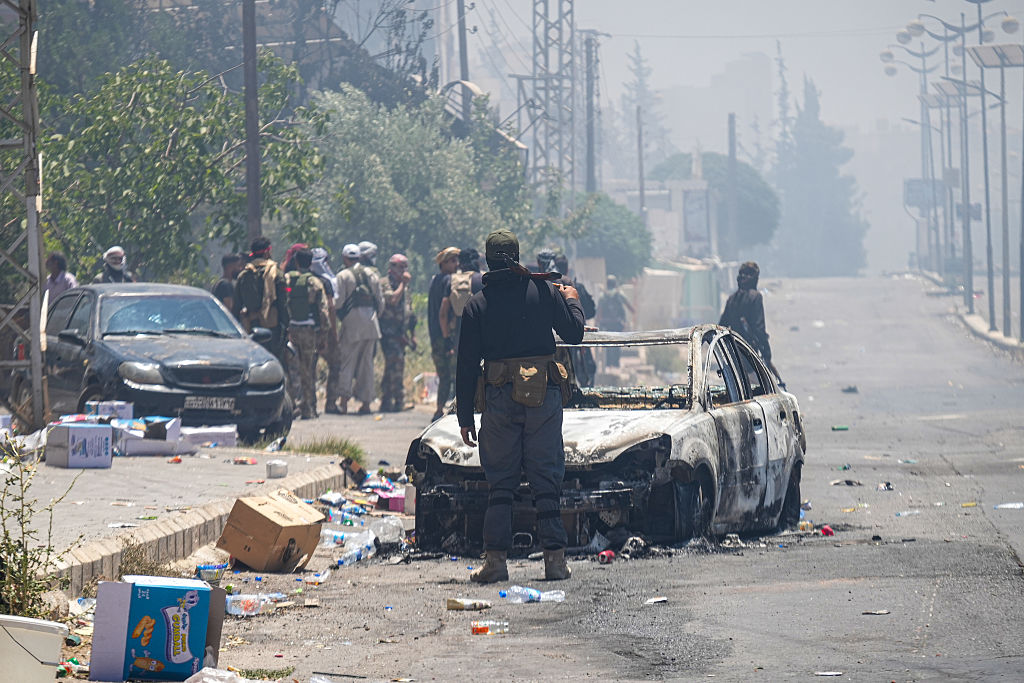Sectarian clashes escalated on Saturday in Syria’s predominantly Druze region of Sweida, with machine gun fire and mortar shelling heard after days of bloodshed, as the Islamist-led government struggled to enforce a ceasefire.
Reuters reporters heard gunfire from inside Sweida city and saw shells landing in nearby villages. There were no immediate, confirmed reports of casualties.
The government had announced that security forces were being deployed to the southern region in an effort to maintain peace and urged all parties to halt fighting after nearly a week of factional violence in which hundreds have been killed.
Late on Saturday, the interior ministry said clashes in Sweida city had subsided and the area had been cleared of Bedouin tribal fighters following the deployment.
The Syrian Observatory for Human Rights, a UK-based monitoring group, reported that at least 940 people had been killed in clashes around Sweida since last week. Reuters could not independently verify the death toll.
Interim President Ahmed al-Sharaa stated that “Arab and American” mediation had helped restore calm before the latest escalation. He also criticized Israel for conducting airstrikes earlier in the week.
Violence in Druze Region Challenges Damascus
The fighting poses a fresh challenge to the authority of Sharaa’s Islamist-dominated government, which assumed power after rebels ousted autocratic President Bashar al-Assad in December.
The unrest began last week as clashes between the Druze—a religious minority native to southern Syria, the Israeli-occupied Golan Heights, and parts of Lebanon and Jordan—and Syrian Bedouin tribes. Government forces intervened to defuse tensions but ended up clashing with Druze gunmen and attacking Druze communities.
Saturday’s violence once again pitted Druze fighters against Bedouin tribesmen, according to eyewitnesses.
The conflict has drawn in neighboring Israel, which launched airstrikes in southern Syria and on the defense ministry in Damascus while Syrian government forces battled Druze fighters. Israel claims it is acting to protect the Druze, who also form a notable minority in Israel.
However, Israel and Washington remain divided over Syria. The U.S. supports a centralized Syrian state under Sharaa’s leadership, which has pledged to govern for all citizens. Israel, however, argues that the government is dominated by jihadists and poses a threat to minorities.
In March, Syrian government forces were implicated in mass killings of members of the Alawite minority, from which much of Assad’s elite hailed.
Tensions at a Boiling Point
On Saturday, the Syrian presidency issued a statement announcing an immediate ceasefire and called for an end to hostilities. President Sharaa declared that Syria would not become “a testing ground for partition, secession, or sectarian incitement.”
He blamed Druze gunmen for the latest outbreak, accusing them of launching revenge attacks against Bedouins.
Israeli Foreign Minister Gideon Saar condemned Sharaa’s remarks, saying he was siding with the attackers. “In al-Sharaa’s Syria, it is very dangerous to be a member of a minority—Kurd, Druze, Alawite, or Christian,” he wrote on X.
On Friday, U.S. envoy Tom Barrack announced that Syria and Israel had agreed to a ceasefire. Barrack, who serves as both U.S. ambassador to Turkey and Washington’s Syria envoy, called on Druze, Bedouins, Sunnis, and other minority groups to “build a new and united Syrian identity.”
Israel has repeatedly targeted Syrian military facilities since Assad’s fall, saying it wants southern Syria, particularly areas near its border, to remain demilitarized. On Friday, an Israeli official said Israel had agreed to allow Syrian forces limited access to Sweida for two days.
Sweida Hospital Overwhelmed
Mansour Namour, a resident of a village near Sweida city, reported that mortar shells were still falling near his home on Saturday afternoon, with at least 22 people wounded.
Dr. Omar Obeid, director of a local hospital in Sweida, said the facility was overwhelmed. “The hospital is full of bodies and wounded from the past few days. All the injuries are from bombs—some with chest wounds, others with shrapnel injuries to their limbs,” he said.
–Reuters










